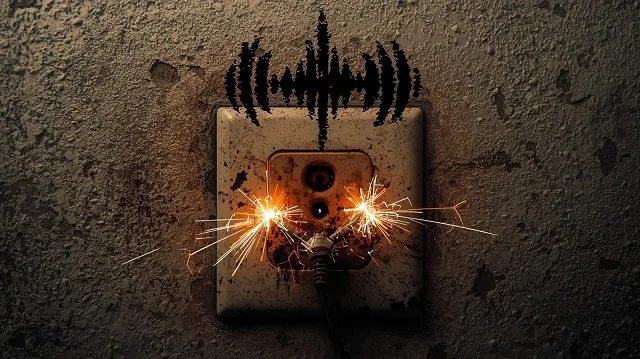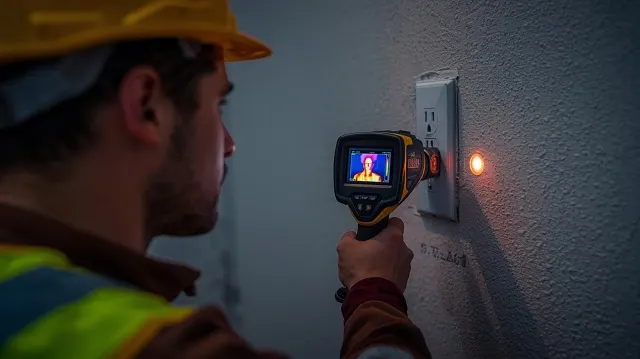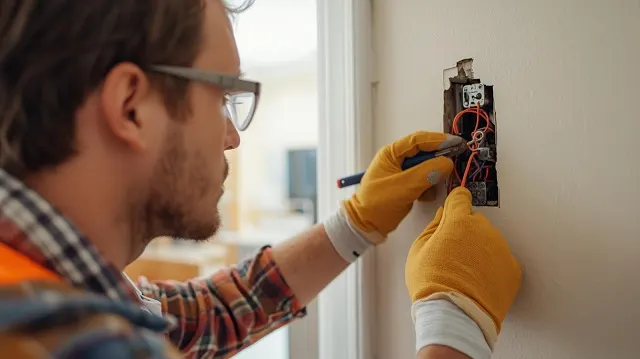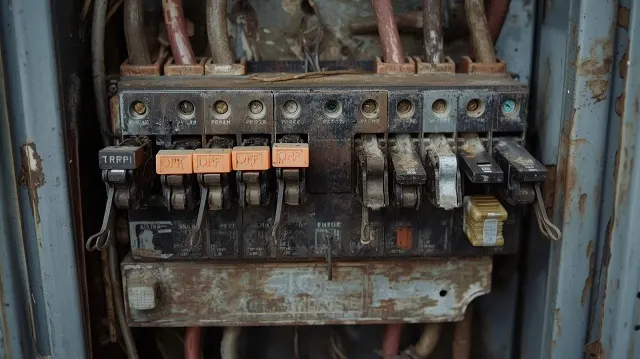If you notice a burning smell from outlets or hear your electrical outlet makes a buzz or humming noise, you’re dealing with serious warning signs that demand immediate attention. These aren’t minor inconveniences—they’re your home’s way of alerting you to potentially dangerous electrical problems that could lead to an electrical fire, property damage, or even injury. Whether you live in a charming 1960s Burbank bungalow or a modern home in the Media District, understanding these warning signs and knowing how to respond can protect your family and property.

This comprehensive guide will help you identify what’s causing that outlet smell or buzzing sound, explain the safety risks involved, and show you exactly when to call a licensed electrician. You’ll learn which situations require emergency electrical attention and discover practical prevention strategies to keep your Burbank home safe. The outlet could be sending you critical signals right now—don’t wait until a small electrical issue becomes a catastrophic house fire. Read on to protect what matters most.
Recognizing the Warning Signs: When Your Outlet Smells Like Burning or Makes Strange Sounds
The first step in electrical safety is recognizing when something’s wrong. A burning smell from outlets is one of the most alarming signs your electrical system can produce. This outlet smell is often described as burning plastic, hot wires, or even a fishy odor, and it indicates that electrical components within the outlet are overheating or melting. This electrical burning smell is a sign of an electrical problem that requires immediate attention.
Similarly, if your outlet makes a buzzing, humming, or crackling sound, this indicates electrical current isn’t flowing properly. A buzzing outlet typically signals loose connections, damaged wiring, or an overloaded circuit struggling to handle the electrical load. Both burning smells and buzzing sounds are your home’s alarm system telling you that electrical risk exists. In fact, electrical fire smells are often the first indicator of a developing hazard within the outlet.
Other critical warning signs include discoloration or scorch marks around the outlet face, a warm outlet that feels hot to the touch, sparks when plugging in an appliance, or circuit breakers that trip frequently. If you notice a burning smell coming from one outlet or observe any of these symptoms, the outlet could be failing and poses a serious fire hazard. One outlet showing these signs may indicate a larger problem with your home’s electrical system that requires immediate professional attention.
Common Causes of Burning Smells From Outlets: Understanding the Source of the Burning Smell
Understanding what can cause a burning smell from outlets helps you recognize the severity of the situation. The most common culprit is overload, which occurs when you plug too many high-wattage appliances into a single outlet or circuit. When an electrical outlet handles more current than it’s designed for, the wiring heats up, and the insulation begins to melt, producing that distinctive burning odor. This is especially true with an overloaded circuit that exceeds its rated capacity.
Another frequent source of the burning smell is loose or damaged connections within the outlet. When electrical connections aren’t secure, they create resistance that generates excessive heat. This heat can cause the outlet or wiring insulation to burn, emit a smell, and potentially start an electrical fire. A damaged outlet with cracked or broken components can also produce electrical burning smell as electrical current arcs between damaged parts.
Old or deteriorating wiring is particularly problematic in older Burbank homes. As electrical wiring ages, the insulation becomes brittle and can crack or wear away, exposing bare wires. This exposure leads to short circuits, arcing, and overheating—all causes of electrical fires in residential properties. Additionally, aluminum wiring common in homes built in the 1960s and 1970s can oxidize over time, creating high-resistance connections that generate heat and create a strong burning smell.
A faulty outlet itself may be responsible for the smell of burning you detect. Outlets wear out over time, and internal components can fail, causing poor connections that overheat. If an appliance or outlet is malfunctioning, it can draw excessive current, leading to a burning smell or fire hazard. A bad outlet should never be ignored—what smells like it’s burning today could become flames tomorrow.
What Causes a Buzzing Outlet: Electrical Issues Behind the Noise
When your outlet makes a buzzing or humming sound, several electrical risks could be responsible. The most common cause is loose wiring connections inside the outlet box. When wires aren’t properly secured, electricity can arc across small gaps, creating that distinctive buzzing sound. This arcing generates heat within the outlet and represents a serious fire hazard that requires immediate attention from an electrician.
An overloaded circuit can also cause your electrical outlet to buzz. When too many appliances draw power simultaneously, the outlet struggles to handle the electrical load, causing vibrations and buzzing sounds. This is especially common in Burbank homes during summer months when air conditioning units, pool equipment, and other high-draw appliances run constantly, putting strain on older electrical systems.
Reversed polarity—where the hot and neutral wires are connected incorrectly—can create buzzing in a burning outlet that’s beginning to fail. This wiring mistake creates an abnormal current flow that produces buzzing sounds and poses a risk of electrical shock. Additionally, incompatible dimmer switches or devices can cause electromagnetic interference that makes outlets hum when certain appliances are connected.
Sometimes the buzz isn’t coming from the outlet itself but from an appliance plugged into it. However, if you unplug everything and the outlet still makes noise, the problem lies within the outlet or wiring. A damaged outlet with worn internal components, corroded connections, or a failing circuit breaker can all produce buzzing sounds that indicate electrical issues needing professional diagnosis from qualified electrical services.
Why You Should Never Ignore Burning Smell From Outlets
The consequences of ignoring a burning smell from outlets can be devastating. Electrical fires are among the leading causes of house fires in California, causing millions in property damage and tragic loss of life annually. When you smell burning plastic or notice electrical fire smells, you’re detecting the early warning signs of a potential electrical fire. The outlet may already be smoldering within your walls, and flames could erupt at any moment. This outlet is a serious warning that cannot be dismissed.

Beyond the immediate fire hazard, burning electrical components release toxic fumes that pose serious health risks. Burning insulation, plastic, and other materials produce harmful chemicals that, when inhaled, can cause respiratory problems, headaches, nausea, and long-term health issues. The risk of electrical shock also increases dramatically when outlets overheat or wiring becomes exposed, especially in areas where moisture is present like kitchens and bathrooms. Electrical shock injuries can be severe or even fatal.
Ignoring these warning signs leads to escalating damage and costs. What might start as a simple outlet replacement costing a few hundred dollars can quickly become a multi-thousand-dollar rewiring project if left unaddressed. A serious electrical problem affecting one outlet in your home can spread through your home’s electrical system, damaging the electrical panel, other outlets, and expensive appliances. Insurance companies may deny claims if they determine you neglected obvious warning signs of electrical issues.
The smell is coming from somewhere dangerous in your electrical system—your home is begging for help. Every hour you delay calling an electrician increases the risk of catastrophic failure. Professional electrical services can identify and fix problems before they destroy your home or endanger your family. Never ignore burning smell from outlets—it’s never worth the gamble.
Immediate Steps When You Notice a Burning Smell Coming From Outlets
When you detect a burning smell from an electrical outlet, taking immediate action is crucial. First, unplug any appliance or outlet device connected to the affected fixture. Don’t touch the outlet face if the outlet feels warm—simply remove plugs from it. If you cannot safely access the fixture, leave it alone and proceed to turn off power to the outlet at your electrical panel.
Locate your circuit breaker box and flip the breaker controlling the circuit to the “off” position. If you’re unsure which circuit breaker controls the problem outlet, it’s safer to shut off the main breaker temporarily. This cuts power to the outlet and prevents further overheating. Once power is disconnected, open windows to ventilate any burning odor and ensure fresh air circulation throughout your home.
Carefully inspect the outlet from a safe distance. Look for visible signs of damage like discoloration, melting, scorch marks, or smoke. Do not attempt to carefully remove the outlet cover or perform any electrical work yourself—this poses extreme risk. If you see flames, smoke, or the strong smell continues, evacuate immediately and call 911.
After ensuring immediate safety, contact a licensed electrician for emergency assistance. Professional electrical services in Burbank offer 24/7 availability for situations exactly like this. Explain the situation and describe any other warning signs you’ve observed. An experienced electrician will prioritize your call and arrive quickly to diagnose the serious problem and implement safe repairs, ensuring your home’s electrical system is secure.
When to Call an Electrician: Professional Help for Outlet Issues
Certain situations absolutely require professional help. If you smell a burning odor from any outlet in your home, call an electrician immediately—this is never a DIY electrical work situation. Similarly, any buzzing that persists after unplugging appliances needs professional diagnosis. These warning signs indicate problems within your electrical system that only trained professionals should handle.
You should also contact an electrician if you notice your outlet feels warm even when nothing’s plugged in, if you see discoloration or melting around the fixture, or if sparks occur when you plug things in. A bad outlet might seem like a minor issue, but it represents a failing outlet in your electrical system that could cause a burning smell or fire hazard if not promptly replaced.
Homes in older Burbank neighborhoods particularly benefit from professional electrical inspections. If your home was built before 1980 and you’ve never had the wiring updated, you’re at higher risk for outlet issues, overloaded circuits, and other electrical problems. An electrician can assess whether your panel provides adequate capacity for modern electrical demands and identify potential hazards.
Call an electrician right away if you experience frequent circuit breaker trips, outlets that don’t work, flickering lights throughout your home, or multiple fixtures showing warning signs. These symptoms suggest larger electrical faults rather than isolated problems. A GFCI outlet that won’t reset in kitchens or bathrooms also requires professional attention, as these safety devices protect against shock hazards in wet locations.
Professional electricians have specialized tools to safely diagnose issues your eyes can’t see. Thermal imaging cameras detect hot spots behind walls, multimeters test for proper voltage and grounding, and circuit analyzers identify overload and wiring problems. Attempting DIY electrical work without proper training and electrical equipment puts you at serious risk, causes further damage, and creates potential code violations that affect your home’s safety and resale value.
How Electricians Fix Burning Smell From Outlets and Buzzing Problems
When you call an electrician for a burning smell or buzzing sound, they begin with comprehensive diagnosis. They’ll test the outlet for proper voltage, check that it’s correctly grounded, inspect electrical connections for looseness or corrosion, and use thermal imaging to detect overheating inside walls. This thorough assessment identifies the exact causes of a burning smell and determines whether the problem is isolated or indicates broader issues.
For a damaged outlet producing a burning smell, the electrician will carefully remove the outlet after ensuring power is disconnected. They’ll inspect the wiring connections, outlet box, and surrounding components for heat damage. If the outlet or wiring shows signs of burning, melting, or degradation, complete outlet replacement is necessary. Modern replacement includes proper wire connections using approved methods, ensuring adequate wire length, and installing the fixture securely in the box with proper grounding.

When an overloaded circuit causes the burning smell, solutions may include redistributing electrical loads across multiple circuits, installing dedicated circuits for high-wattage appliances like air conditioners or electric vehicle chargers, or upgrading your panel to handle increased capacity. Many older Burbank homes have 100-amp panels insufficient for modern demands—upgrading to 200-amp service prevents overload and eliminates fire risks from overtaxed circuits.
For buzzing caused by loose connections, electricians tighten all wire connections to manufacturer specifications, replace worn wire nuts, and may install new outlets if internal components are damaged. If reversed polarity causes the buzz, they’ll correct the wiring configuration to restore proper flow. When electromagnetic interference from incompatible dimmers creates buzzing, they’ll recommend and install appropriate dimmer switches designed for your specific lighting or appliances, rather than the outlet being the issue.
In homes with aluminum wiring or outdated systems, more extensive work may be necessary. Electricians can install specialized connectors rated for aluminum wiring, apply anti-oxidant paste to prevent corrosion, or recommend whole-house rewiring for maximum safety. They’ll also install GFCI outlets in required locations like kitchens, bathrooms, garages, and outdoor areas to protect against shock, and add Arc Fault Circuit Interrupter (AFCI) protection to prevent fires caused by arcing faults, ensuring your home’s electrical system meets all current safety standards.
Preventing Burning Smells and Outlet Problems in Your Burbank Home
Preventing burning smells starts with avoiding circuit overload. Distribute high-wattage appliances across different outlets and circuits rather than plugging everything into a single fixture. Use power strips with built-in overload protection, but never daisy-chain multiple power strips together. Be especially mindful during Burbank’s hot summers when air conditioners, fans, pool pumps, and cooling appliances all compete for power.
Regular inspection helps catch outlet issues before they become major risks. Monthly, visually check all fixtures in your home for discoloration, cracks, or loose components. Test outlets by gently wiggling plugs—excessive movement suggests worn parts that should be replaced. If a fixture feels warm, stop using it immediately and call an electrician. These simple checks help you detect problems or other warning signs before an electrical fire develops.
Never ignore red flags or assume problems will resolve themselves. If you detect an odor once, even if it goes away, the underlying problem remains. That single fixture showing issues might be the tip of the iceberg, indicating problems throughout your electrical system. Schedule professional inspections every 3-5 years, or annually for homes over 40 years old, to catch issues before they cause burning smells or fires.
Upgrade fixtures in critical locations to improve safety. Install GFCI outlets in all wet locations to prevent shock hazards. Replace standard outlets with tamper-resistant models if you have children. Consider USB outlets for bedrooms and living areas to reduce the need for plug adapters that can overload circuits. Weather-resistant fixtures for outdoor areas protect against moisture that can cause faults leading to burning smells or fire hazards.
Practice safe appliance use by unplugging devices when not in use, especially heat-generating appliances like irons, space heaters, and hair styling tools. Never run cords under rugs where damage can go unnoticed until the appliance or outlet emits a burning smell. Replace any appliance with a frayed cord immediately—the risk of shock and fire isn’t worth keeping a damaged device.
Ensuring your electrical system meets current Burbank building codes and safety standards protects your investment and family. If your home was built decades ago, your panel, wiring, and outlets may not meet modern safety requirements. Proactive upgrades prevent the causes of burning smells, reduce fire hazards, and provide peace of mind that your system can safely handle your family’s needs.
Identifying vs. Investigating: What to Do When You Smell Something Burning
When you first detect a smell coming from an outlet, your immediate reaction might be to investigate the source. However, it’s crucial to understand when investigation is safe and when you should evacuate immediately. If you smell something burning in your home, pause and assess the situation before taking action.

A burning smell from an outlet is distinctly different from other household odors. Electrical smells are typically sharp, acrid, and often smell like hot plastic or melting insulation. If the odor is strong and clearly coming from an electrical outlet, do not attempt to closely inspect or touch the fixture. The potential for electrical fire increases dramatically when outlets are actively overheating.
Never ignore a burning smell, even if it seems faint or intermittent. The actual cause of the burning smell may be hidden behind walls or within outlet boxes where you cannot see it. What starts as a subtle burning smell in your home can quickly escalate into a dangerous situation. If you’re uncertain whether you smell something burning or if it’s just a passing odor, err on the side of caution and contact a licensed electrician for professional evaluation.
Remember: your safety comes first. Any burning smell in your home warrants immediate attention, and professional electricians have the tools and expertise to safely identify and resolve the issue before it becomes a catastrophic fire hazard.
Key Takeaways: Essential Facts About Burning Smell From Outlets and Buzzing Sounds
• A burning smell from outlets is a critical alert that should never be ignored—it indicates overheating electrical components that could cause an electrical fire at any moment
• Buzzing outlets signal dangerous electrical problems including loose connections, overloaded circuits, or damaged wiring that require immediate professional attention from a licensed electrician
• Common causes include overloaded circuits, loose electrical connections, damaged outlets, deteriorating wiring, and failing appliances drawing excessive current
• Never perform DIY electrical work when you sense a smoky odor or buzzing—the risk of electrocution, fire, and code violations far outweighs any cost savings
• Take immediate action by unplugging devices, turning off the circuit breaker, and calling an emergency electrician when you smell burning or hear buzzing from any fixture
• Older Burbank homes face higher risks due to outdated wiring, undersized panels, and aluminum wiring that can oxidize and create dangerous high-resistance connections
• Prevention is key through avoiding overload, conducting regular outlet inspections, upgrading outdated systems, and installing GFCI outlets and AFCI circuit breakers for enhanced protection
• Professional electricians provide thermal imaging, circuit analysis, proper repairs using code-compliant methods, and comprehensive solutions that address both symptoms and root causes
• Health and safety risks from ignoring danger signals include toxic fume exposure from burning plastic, shock hazards, devastating house fires, and expensive damage to your property’s infrastructure and appliances
• Multiple red flags together such as smoky smells combined with warm outlets, humming sounds, or frequently tripping circuit breakers indicate major problems requiring comprehensive panel and wiring evaluation by qualified professionals
Your home’s electrical safety depends on recognizing these warning signs and responding appropriately. When you notice a burning smell from an electrical outlet or hear buzzing sounds, you’re receiving critical alerts that electrical problems exist. Don’t gamble with your family’s safety—contact a licensed Burbank electrician immediately to diagnose and resolve these issues before they lead to catastrophic electrical fires or injuries.

Pingback: Old Wiring Risks In Burbank Homes Built Before 1975
Pingback: Why Do Lights Flicker In Burbank Homes?